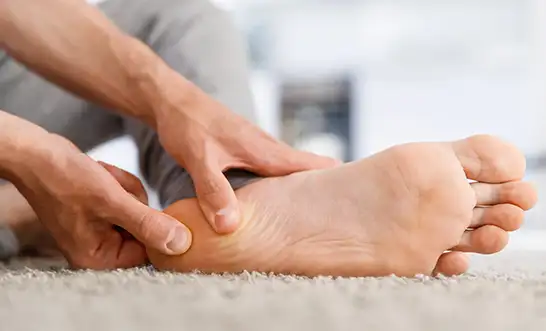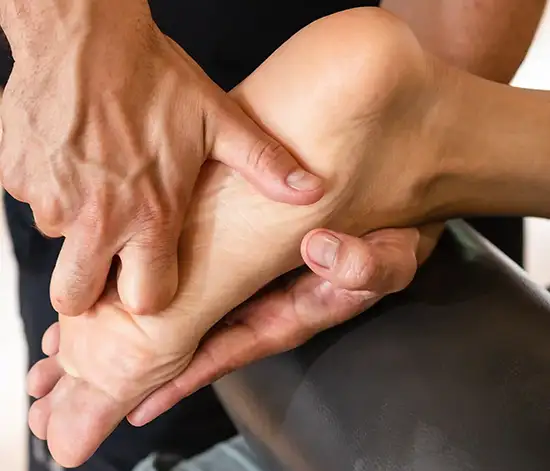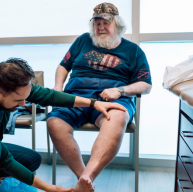Get Lasting Relief for Plantar Fasciitis Heel Pain
Plantar fasciitis can bring sharp, persistent heel pain, making it a constant challenge to feel comfortable on your feet or even while resting. Our foot specialists are committed to offering comprehensive support and targeted treatment for plantar fasciitis that focuses on relieving your heel pain, restoring your mobility, and helping you return to the activities you enjoy.
Get Lasting Relief for Plantar Fasciitis Heel Pain

- Advanced Treatment Options
- Patient-Centric Approach
- Comprehensive Care Network
Understanding Plantar Fasciitis

Understanding Plantar Fasciitis
If you suffer from heel pain due to plantar fasciitis, you understand how frustrating and painful it can be. Inflammation of the plantar fascia, a thick band of tissue that runs along the bottom of the foot, causes discomfort in the heels that can interfere with your daily activities and disrupt every moment with constant pain.
Our holistic approach to treating your plantar fasciitis includes a variety of gentle, proven therapies aimed at easing pain, promoting healing, and preventing heel aches due to plantar fasciitis from coming back. Use the tool below to find a StrideCare podiatrist near you to get started and find relief from plantar fasciitis today.
Our Proven Approach to Treating Plantar Fasciitis Pain
Our plantar fasciitis treatment is designed to provide relief that addresses not only the immediate pain in your heel but also the underlying factors contributing to your condition. We offer patient-centered solutions to reduce inflammation, support recovery, and prevent future pain, including:
- Thorough assessment and diagnosis
- Customized stretching and strengthening exercises
- Orthotics and supportive footwear
- Physical therapy and manual treatments
- Medications and corticosteroid injections
This comprehensive approach to treatment helps relieve your heel pain while supporting long-term healing and enhanced mobility. Contact our team of podiatry specialists today or book an appointment online to start the healing process and get relief from plantar fasciitis pain.
Here’s What Patients Are Saying About Our Care



4.89 Average Online Review Score



Causes of Plantar Fasciitis
Plantar fasciitis occurs when the plantar fascia becomes inflamed due to repetitive stress or strain. This condition is especially common among people who engage in high-impact activities, such as running or jumping, and those who spend prolonged hours standing or walking. Wearing inadequate or unsupportive footwear can further contribute to the development of plantar fasciitis by failing to properly support the arch and heel.
While plantar fasciitis can develop without an identifiable cause, certain risk factors increase its likelihood. Flat feet, high arches, or an abnormal walking pattern can place extra strain on the plantar fascia. Additionally, occupations that involve extended standing or walking are known to increase the risk of heel pain and inflammation. Understanding these causes can help us create a more effective and targeted treatment plan for your plantar fasciitis.
Symptoms of Plantar Fasciitis and When to Seek Treatment
Identifying plantar fasciitis symptoms early on can make a big difference in finding relief and preventing the condition from worsening. Here are a few of the most common symptoms to watch out for that may indicate the need for plantar fasciitis treatment:
- Sharp heel pain when first getting up in the morning
- Pain that worsens after activity, not during it
- Tenderness or stiffness in the heel or bottom of the foot
- Discomfort that radiates along the arch of the foot
- Pain that lingers despite rest or over-the-counter treatments
If you have any of the symptoms of plantar fasciitis listed above, our expert podiatry team at StrideCare can help you relieve pain, enhance daily comfort, and protect your overall foot health from future problems with plantar fasciitis.
Find Effective Plantar Fasciitis Treatment Near You
Are you currently experiencing debilitating pain in your heel due to plantar fasciitis?
Enter your zip code below to find a StrideCare podiatrist near you and start the healing process today.
Frequently Asked Questions about Plantar Fasciitis
Does plantar fasciitis only affect athletes or active individuals?
While athletes and those who are highly active are more prone to plantar fasciitis due to repetitive stress, it can affect anyone, especially those who spend long hours standing or walking, wear unsupportive footwear, or have certain foot structures like flat feet or high arches.


